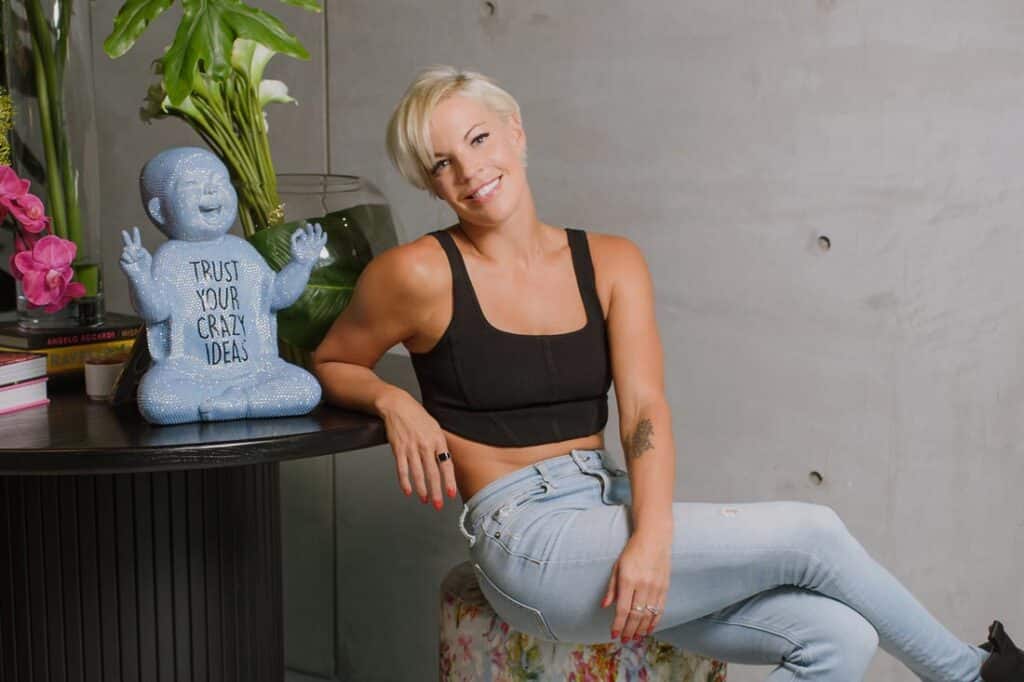If you learn one thing from Anne Mahlum’s eight-figure success with Solidcore, make it this: Your relationship with money could be holding back your business. If you have a scarcity mindset rather than trusting yourself to go out and make more funds when you need them, it’s going to be hard for you to scale up as an entrepreneur. Also, if you’re micromanaging your talent instead of trusting them, you’re wasting your time.
“Think about how you were spending your time six months ago,” Mahlum says. “If you’re trying to scale and you’re spending your time the exact same way, something’s wrong. You’re never going to get there.”
When Mahlum started Solidcore in 2013, which now has over 100 studios across the U.S., she had $175,000 in savings. And when she says she put all of it into the business, she really means all of it. She was adding up every expense and weighing where to splurge on a wise investment and where to save a few grand. For example, instead of paying $10,000 to have wood pallets installed as a studio wall backdrop, she ordered pallets from a website that was giving them away for free and persuaded her friends to help her sand them down for a DIY job.
“I literally felt like I had just enough money,” she says. “Between the machines I had to buy, the licensing agreement, the lease I had to sign, the security deposit, the construction build-out—I’m like, ‘This is everything, everything I’ve got.’”
Ultimately, it paid off. The first studio broke six figures of revenue in its first month, and she quickly started to scale. She sold many of her shares for close to $90 million last year and is now considering her next venture.
Solidcore founder Anne Mahlum’s top tips for scaling a business
To get the business where it is today, Mahlum frequently reevaluated how she was spending her money and time. In the early days, she enjoyed personally coaching classes, but she soon pivoted to hiring other instructors and negotiating with landlords who would accept higher rent in lieu of huge security deposits that would tie up capital.
Here are some of her biggest pieces of advice for scaling a small business into a full-blown national brand.

1. Know the difference between overspending and investing
It’s important to figure out where to save and where to invest when it comes to talent. When Mahlum first launched Solidcore, she was so hands-on with the business that she personally taught classes. But eventually, that wasn’t a smart use of her time, she says.
“I love coaching—don’t get me wrong—but there are other people who can do this just as good or better than I can, and frankly, I [needed] dozens and hundreds, and now we need thousands of them,” she says. Figuring out that piece allowed the company to grow.
Today, the company has grown so much that it employs a full-time graphic designer. That never would have been a wise use of money when the brand was in its infancy and needed “amazing generalists,” she says.
2. Don’t hedge bets against yourself
Before Mahlum opened the first studio, a friend and colleague offered her a $75,000 investment for a 30% stake in the company. At first, it seemed like a good deal, as it would have given her a bit more wiggle room in the early days of the brand. But she realized that if she was already making a “just-in-case” fail-safe, she was investing in self-doubt rather than a successful venture.
“When anything goes wrong, I’m gonna start to actually put more quarters in that [self-doubt] jar because I’ve hedged my bets,” she says of her thinking at the time. “I’m actually not gonna be as determined or hungry to figure things out if I have this cushion.”
3. Be direct with your team—even when it’s brutally honest
Mahlum says she has often seen people second-guess their choices and ask for her approval when decision-making was an essential part of their jobs. But it’s crucial for employees at the highest levels to exert confidence in their decisions and not constantly ask for approval to “protect” themselves in the event something goes wrong, Mahlum says.
“You have to stop coming to your supervisors for protection over decisions,” she says. “If I can’t see that you’re comfortable making decisions on your own at this level, you shouldn’t be a director.”
4. Write a letter to your money
Mahlum recommends reading You Are a Badass at Making Money: Master the Mindset of Wealth by Jen Sincero. One of the exercises in the book is to write a letter to money. “It’s like, ‘Dear Money, I miss you,’” Mahlum says. “‘You never come around enough.’ Or like, ‘Dear Money, you make me feel bad about myself.’” It’s funny, but it’s also a clever way to evaluate your relationship with money and wealth. Mahlum recommends questioning why you want money. “Is it status? Is it freedom? Is it flexibility? Is it opportunity?”
Mahlum’s parents have polar opposite money habits. Her father gambled away their savings, while her mother has squirreled away her earnings but doesn’t feel comfortable spending what she has. Mahlum’s relationship with money has fluctuated accordingly. At 26, she was broke and needed to ask her mom for cash. Now, she’s among the world’s wealthiest women. But what she doesn’t want to do is hold steady and become too risk averse.
“I want to live a big, full, exciting life,” she says. “And if I want to do that, I have to work on getting my life into abundance. I have to be generous; I need to spend—there needs to be balance there. I want a life of abundance, not scarcity.”
This article originally appeared in the May/June 2024 issue of SUCCESS magazine. Photo by ©VanessaandJohnny.com/Courtesy of Anne Mahlum.







